

Myths of British ancestry revisited. Discuss this article at First Drafts, Prospect’s blog Stephen Oppenheimer’s article “Myths of British ancestry” in the October 2006 issue of Prospect attracted a huge online readership, and continues to generate comments and responses.
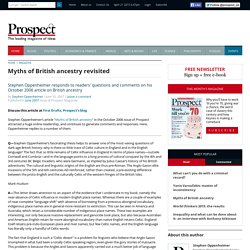
Here, Oppenheimer replies to a number of them. Q—Stephen Oppenheimer’s fascinating thesis helps to answer one of the most vexing questions of dark-age British history: why is there so little trace of Celtic culture in England and in the English language? The fact that so little remains of Celtic influence in England in terms of place names—outside Cornwall and Cumbria—and in the language points to a long process of cultural conquest by the 4th and 3rd centuries BC Belgic invaders, who were Germanic, as implied by Julius Caesar’s history of his British adventures.
The cultural and linguistic origins of the English are thus pre-Roman. Mark Hudson I guess I would see it the other way around. Stephen Oppenheimer Martin Nichols Douglas Forbes Christine Peace. Myths of British ancestry. Read Stephen Oppenheimer’s follow-up to this article here, in the June 2007 edition of Prospect, as he answers some of the many comments and queries readers have sent in response to his analysis.
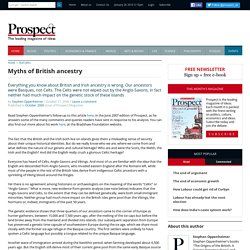
You can also find out more about his work here, at the Bradshaw Foundation website. THE CELTIC MYTH. I see no good reason to doubt he statements of Gildas, written to convince highly literate people to take a desired course of action just a few generations afterwards. of course Gildas says the cities were deserted and abandoned after the Saxon revolt and archaeology says that the cities had been declining for decades before that.
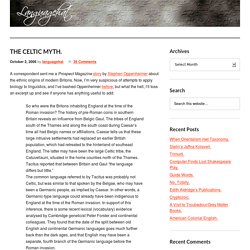
Also no archaeologist ever found heaps of skeletons littering the streets of Roman-British cities – which however were usually continuously occupied for at least a thousand years before archaeology began, and thus were not virgin sites. Perhaps the traditions which Gildas used mixed up cities and civates, the city states which all had cities as their capitals.
Perhaps many Romano-British city states were were surrounded by walls, fences, hedges, dykes and other border barriers and had gates on the rods. But as far as I know people who spoke British or Welsh or were considered to be ethnically British or Welsh remained as a minority in England for centuries. History - Ancient History in depth: Native Tribes of Britain. We're nearly all Celts under the skin. A MAJOR genetic study of the population of Britain appears to have put an end to the idea of the "Celtic fringe" of Scotland, Ireland and Wales.
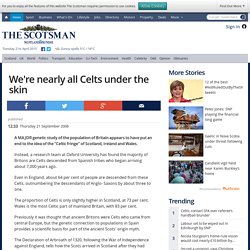
Instead, a research team at Oxford University has found the majority of Britons are Celts descended from Spanish tribes who began arriving about 7,000 years ago. Even in England, about 64 per cent of people are descended from these Celts, outnumbering the descendants of Anglo- Saxons by about three to one. The proportion of Celts is only slightly higher in Scotland, at 73 per cent. Wales is the most Celtic part of mainland Britain, with 83 per cent. Previously it was thought that ancient Britons were Celts who came from central Europe, but the genetic connection to populations in Spain provides a scientific basis for part of the ancient Scots' origin myth. The study linked the male Y-chromosome to the birthplace of paternal grandfathers to try to establish a historic distribution pattern. Celts descended from Spanish fishermen, study finds - This Britain - UK - The Independent.
Don't tell the locals, but the hordes of British holidaymakers who visited Spain this summer were, in fact, returning to their ancestral home.
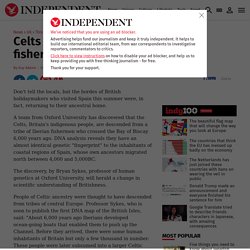
Simon James's Ancient Celts page: alternative history. Were our ancestors much like us?
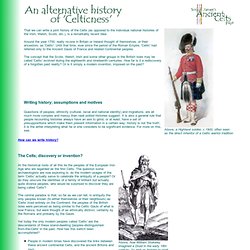
There is another important way in which highlighting the danger of assuming too easily that modern and ancient Celts are somehow identical may help us understand the peoples of the Iron Age more clearly. As the archaeologist J.D.Hill has pointed out, if we assume that the peoples of the Iron Age are our close cultural ancestors, we automatically prejudge what they were like. If we are Celts, and they were Celts, then it is all too easy to think that they must have fitted with our ideas of what Celts are, or recently were. They must fit into the Celtic 'cultural package'; yet that package is largely a modern construct, cobbled together from fragments from different times and places. Once we realise this, other possibilites open up: the Ancient Britons, Irish, and indeed Gauls, may have been very different from us and, if we could meet them, they would actually seem far more alien than we have imagined.
History - Ancient History in depth: Peoples of Britain. What is the difference between Celtic and Scottish. The term 'Celtic' is an 18th century term first invented by Edward Lhuyd in 1707 to group various old regional languages into a grouped system, the term was largely romanticised during the course of the 19th century to a level of fantastical notions, before 1707, the term was unheard of.
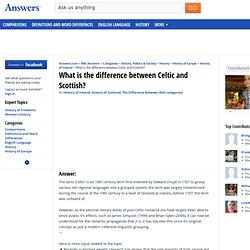
However, as the seminal literary works of post Celtic romance era have largely been able to since assess it's effects, such as James Simpson (1999) and Brian Sykes (2006), it can now be understood for the romantic propaganda that it is, it has become this since it's original concept as just a modern collective linguistic grouping. --- Here is more input related to the topic: Recently published genetic research has shown that the vast majority of Irish people are not Celtic in origin but descend from an earlier race of settlers/invaders.All Scots are NOT Celts. There is no such thing as a Celt.